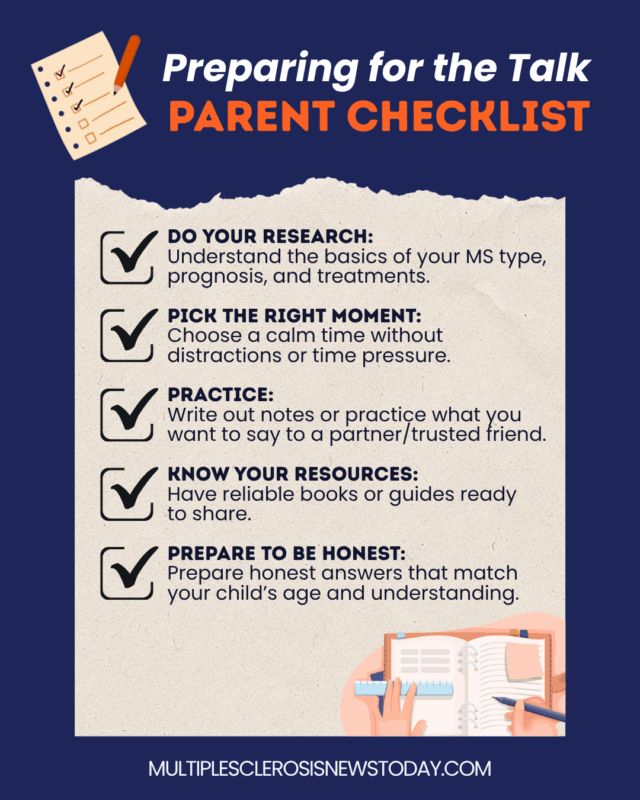
Talking to your kids about your MS diagnosis
Last updated July 7, 2025, by Susie Strachan
Telling your children that you have multiple sclerosis (MS) can feel overwhelming, so much so that you might want to avoid the conversation, but it’s an important one to have.
Your children look to you for honesty and comfort. Including them in what’s happening after your MS diagnosis can help them feel reassured that you’re still there for them.
You don’t have to explain everything about the disease at once. Depending on your child’s age, a simple explanation may be enough to start the conversation.
Why it’s important
Explaining a complex disease like MS to children isn’t easy, especially when you’re still figuring it out yourself.
But talking to your kids about MS is an important part of parenting when living with this chronic illness.
Kids often notice more than we think. They may pick up on your increased fatigue, difficulty walking, or moments when you seem off-balance. These common MS symptoms can be confusing or even scary for children if left unexplained.
Having a conversation with your children about MS shows them that they can come to you with questions and that it’s okay to talk about hard things. These talks can lay the foundation for honest, ongoing dialogue as your family adjusts to life with MS.
Preparing for the conversation
Before you talk to your children about MS, it can help to gather your thoughts. You don’t need a script, but thinking ahead about how much you want to share can make the conversation feel more manageable.
Do your research
Don’t feel like you need to have all the answers, but try to understand the basics of your condition. Learn about your type of MS, how it might progress, and the treatments you’re using.
You can also ask your primary care provider for guidance on how to tell your child you have MS, what kinds of questions might come up, and where to find reliable resources if you need help answering your kids’ queries.
Pick the right moment
Choose a moment when things are relatively calm, without distractions or time pressures. A quiet time at home or during a relaxed part of the day gives everyone space to focus and ask questions. You know your child best, so pick a setting that feels comfortable for both of you.
Practice ahead of time
You might find it helpful to write out a few notes or practice what you want to say out loud.
For instance, you could explain that MS affects everyone differently, but for you, it mostly shows up as fatigue or mood swings. Reassure your child that these symptoms aren’t their fault, and that you’re doing your best to manage them.
If you have a trusted friend or partner, try practicing with them first. Saying the words out loud can help you feel more confident and prepared.

Age-appropriate approaches
Every child processes information differently. One of the most helpful things you can do is to tailor the conversation to your child’s age and level of understanding.
Younger children may need simple, concrete explanations and frequent check-ins, while older kids and teens may be ready for more honest, detailed discussions.
Talking with younger children
For toddlers and preschoolers, simple explanations and reassurance go a long way.
- Use clear, straightforward language, such as “I have something called MS that makes me feel very tired sometimes, or makes it harder for me to move.”
- Reassure them that you’re still there for them and nothing will change in your love and care.
- Little kids have shorter attention spans, so keep the conversation brief but revisit it often.
- Young children often respond well to pictures, so look for books or videos designed to explain MS to kids, or draw pictures that show what it feels like when you get tired.
Talking with school-age children
Elementary-aged kids may be ready to hear a little more about what MS is and how it affects you. You might try:
- going into more detail, such as saying “MS can make me feel really tired, and sometimes I might have trouble walking or doing other things I used to do”
- letting them know they can always ask questions if they have worries or don’t understand something
- helping them understand that it’s not their job to take care of you, and that you have doctors to help you stay as healthy as possible.
Talking with teenagers
Teenagers can usually handle more complexity, and they may have deeper concerns about how MS could affect your family. When speaking with teens, consider:
- explaining how MS affects your nervous system and sharing some of the symptoms you experience, like fatigue or balance problems
- being honest about how MS may change over time, but reassuring them that your care team is helping you manage it
- discussing ways they can support you without feeling overwhelmed, like helping with small tasks when you’re tired
- sitting down together as a family to talk about sharing responsibilities and how everyone can contribute in simple, supportive ways.
Helpful books and resources
There are a few helpful books and online resources that can support you and your children as you talk about MS together.
- Keep S’Myelin: Kids Affected by MS is an activity book for children ages 5 to 12, published by the National MS Society and MS Canada, which also comes with a parental guide.
- When a Parent Has MS: A Teenager’s Guide is a downloadable guide, published by the National MS Society, that offers insights into living with a parent who has MS.
Multiple Sclerosis News Today also offers helpful tips for parents, both in forums and through personal columns, on how to talk with their children about MS.
Handling their emotions
Your child’s reaction to your MS diagnosis may catch you off guard. Some children may become quiet or withdrawn, while others might ask a lot of questions. Children sometimes might even respond with anger or say something hurtful.
These reactions aren’t a reflection of how they feel about you. They’re often signs that your child is trying to make sense of something that feels scary or confusing. Supporting them through those feelings can help your family adjust together to your MS diagnosis.
Make space for their feelings
Let your child know that feeling sad, scared, confused, or angry is okay. You might say, “It’s okay to feel upset or unsure. I’m still figuring this out, too.”
Remind them that there’s no right or wrong way to feel, and that you’re there to talk whenever they’re ready.
Encourage them to stick to their routine
Encourage your child to stay involved with their usual activities, like schoolwork, hobbies, or spending time with friends.
Keeping routines in place and staying connected to school, sports, or clubs can provide a sense of normalcy. Let your child know that even if things feel different sometimes, there’s a plan to keep their world steady and supported.
Be honest about what you need
Be honest about your limitations by sharing that there are days when you might need to rest or take it easy, and that’s okay.
Let them know that you don’t expect them to take on more responsibility than they’re comfortable with, but that their understanding and patience mean a lot.
Share your coping strategies
Share with them how you are, and plan to continue, managing your symptoms, whether it’s through rest, medication, or gentle movement. This can help them better understand how you’re taking control of your health and how they can be supportive in the process.
Consider extra support
If emotions run high or feel hard to manage, your healthcare provider can help connect you with a therapist who works with families navigating chronic illness.
A therapist or counselor can offer emotional support, help you and your children process feelings, and guide you through difficult conversations in a way that builds understanding and connection.
Talking to your children about MS isn’t a one-time event — it’s an ongoing conversation. As they grow and their understanding deepens, they’ll likely have new questions or concerns. By creating an open, honest space now, you’re showing them that no topic is too big for your family to tackle together.
Multiple Sclerosis News Today is strictly a news and information website about the disease. It does not provide medical advice, diagnosis, or treatment. This content is not intended to be a substitute for professional medical advice, diagnosis, or treatment. Always seek the advice of your physician or other qualified health provider with any questions you may have regarding a medical condition. Never disregard professional medical advice or delay in seeking it because of something you have read on this website.




